Because of their large size, mastiffs have historically been kept as guard dogs, war dogs, or hunting dogs. And, while the origin of the name “mastiff” is unclear, some historians believe it evolved from the Anglo-Saxon word “masty,” which translates as “powerful.” When searching for a capable guard dog, a mastiff should be at the top of your list. Here are seven reasons why mastiffs are the perfect guard dog.
#1 Mastiffs Are One of the Largest Dog Breeds
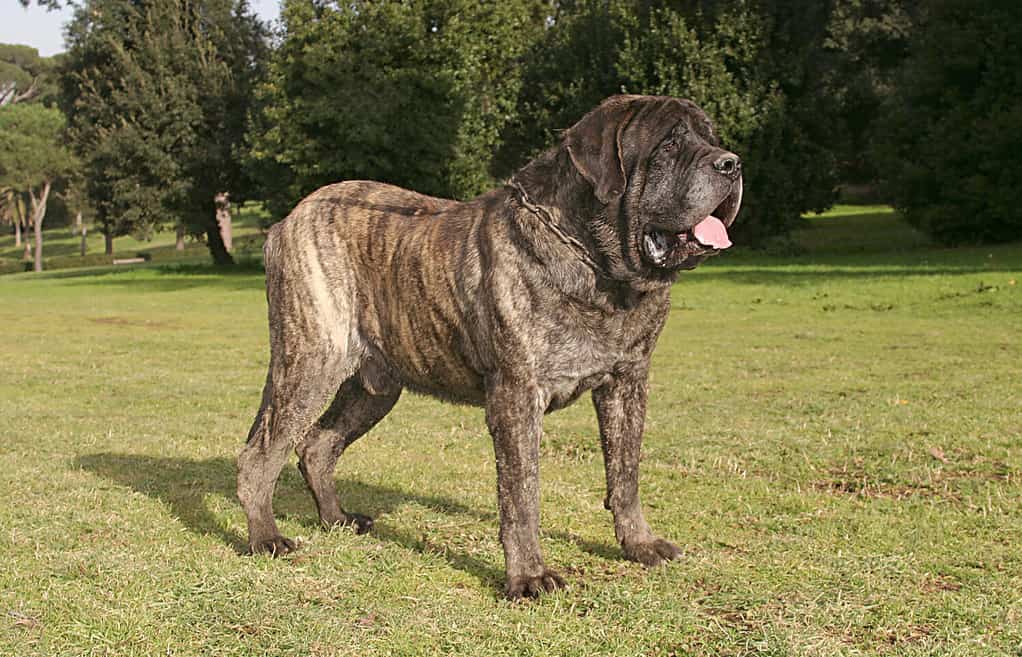
Male mastiffs can weigh up to 230 pounds. That’s about one-fourth the weight of a grand piano!
©Ricantimages/Shutterstock.com
According to the breed standard, male mastiffs’ minimum height is 30 inches measured to the top of the shoulder. The breed standard for females is 27.5 inches to the top of the shoulder. However, mastiffs can grow up to 36 inches tall to the shoulder. For males, they can weigh between 160 and 230 pounds, and for females, they can weigh 120 to 170 pounds.
However, in 1989, a male Old English mastiff named Zorba set the Guinness World Record for the heaviest and longest dog. Zorba weighed 330 pounds and was eight feet and three inches long from nose tip to tail. This Mastiff also stood a little over 37 inches tall at the shoulder. No one is breaking into your house with a guard dog like that!
Needless to say, this breed is one of the largest out of all the dog breeds, making for a very intimidating guard dog.
#2 Mastiffs Are Part of the Working Group
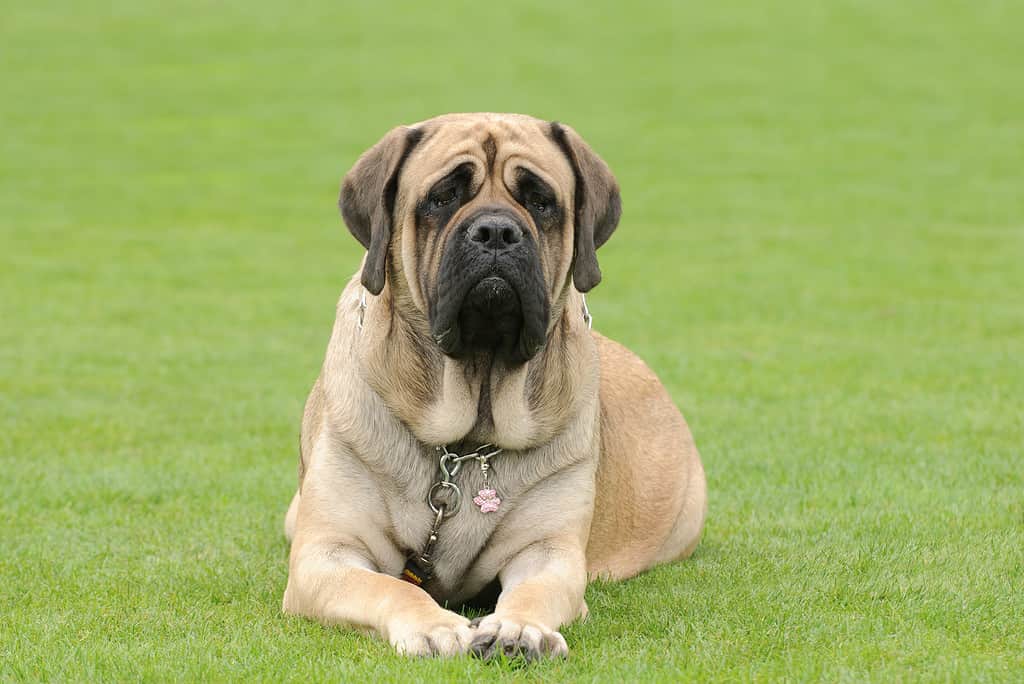
These gentle giants are part of the Working Group, making them excellent at guarding.
©Waldemar Dabrowski/Shutterstock.com
The American Kennel Club classifies the mastiff breed as part of the Working Group. Dogs in the Working Group are characterized by intelligence, strength, alertness, and observant natures. Working Group breeds were reared to assist men and help with tasks. That is why dogs in this group excel at guarding, manual labor such as pulling sleds, or rescue training.
The United Kennel Club classifies the mastiff breed as part of the Guardian Dog Group. This group is broken down into two categories: Flock Guards and Mastiffs. There is a theory that the largest Flock Dogs were selected and bred to be guard dogs or used in war.
All in all, mastiffs were bred to assist and protect man, a job that goes down to their basic instincts.
#3 Mastiffs Are Protective of the Family
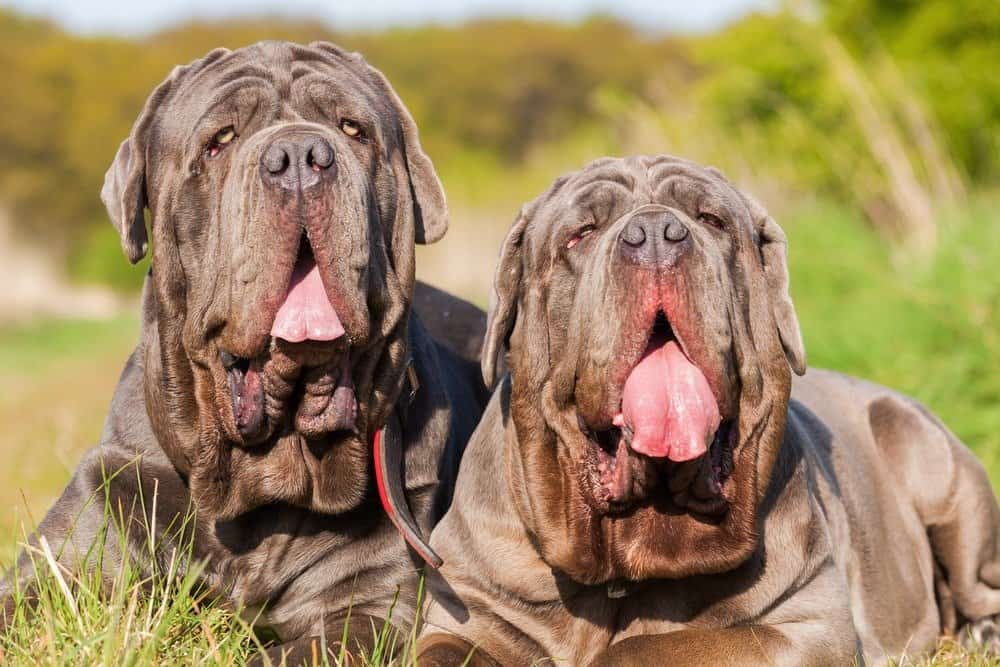
Historically, people have used mastiffs to guard property or protect the home.
©Christian Mueller/Shutterstock.com
Mastiffs are good-natured and protective of their human pack. They are excellent family dogs and placid companions for older kids. However, families with little children should wait to welcome a mastiff because of their vast size.
This protective nature appears especially around strangers. Your mastiff may treat visitors or mail carriers with suspicion or aggression. This trait benefits a guard dog, but you must temper it through socialization and responsive training. This is most crucial when your dog is a puppy. Introducing your mastiff puppy to as many new people and environments as possible will help your dog be open to visiting friends.
But the fact that a mastiff’s fundamental nature is protective is one of the reasons mastiffs are the perfect guard dogs.
#4 Mastiffs Are Very Trainable
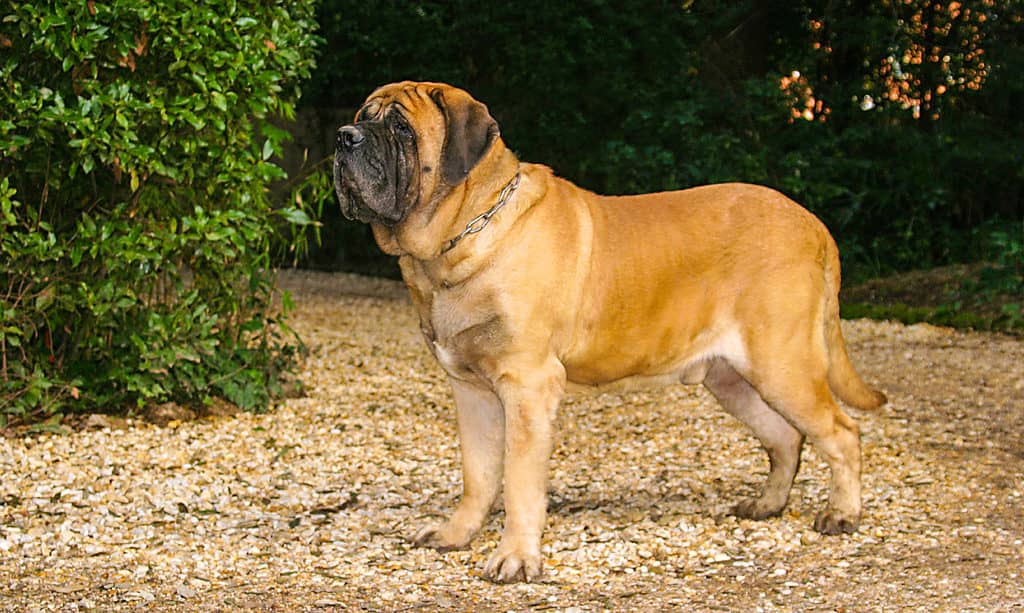
Because of their size and strength, obedience training is important to ensure your mastiff responds well.
©Ricantimages/Shutterstock.com
Smart as a whip and eager to please, you will have an easy time training your mastiff. Through positive reinforcement and consistent training, you will teach your mastiff the correct situations in which to be protective. Training must be a top priority because their strength and desire to protect can get out of control without guidance.
#5 Their Deep Bark Is Intimidating
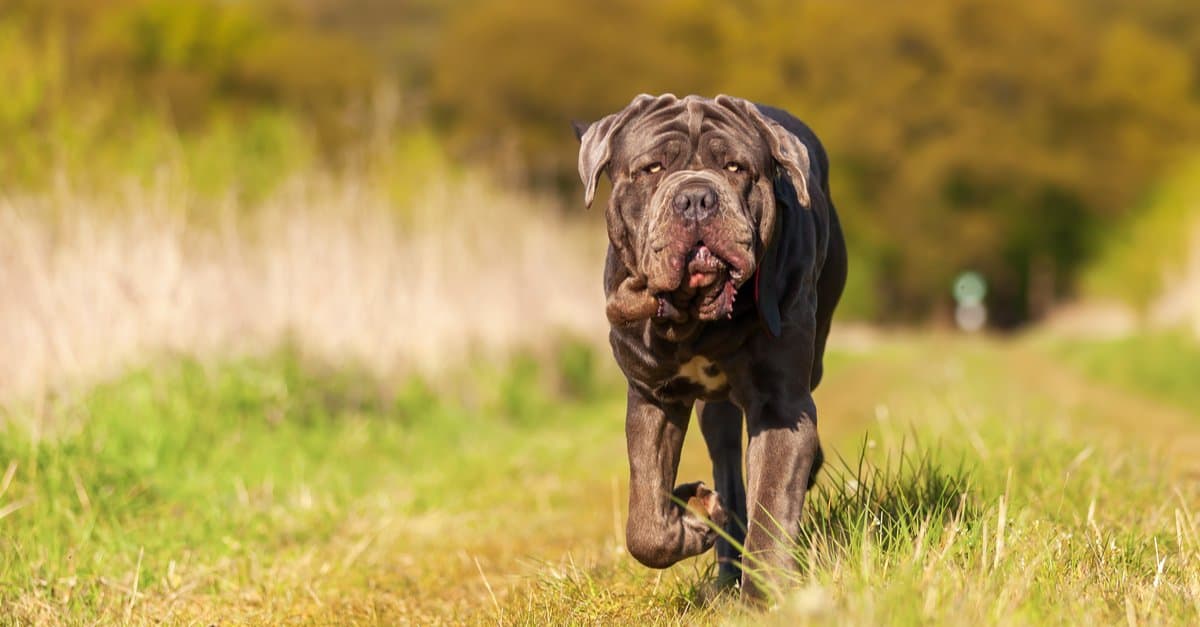
In general, mastiffs aren’t excessive barkers.
©Christian Mueller/Shutterstock.com
Thankfully, mastiffs aren’t yippy like other dog breeds. Because they are naturally alert and watchful, they usually only bark to warn their owners. However, sometimes, the threat your mastiff perceives is not a real threat to you.
Generally, a mastiff’s bark is in response to strangers, unfamiliar stimuli, or if they are uncomfortable. But because of their size, mastiffs produce deep and intimidating barks. This warning can be heard throughout the house and will make anyone breaking in think twice.
#6 They Have a Strong Bite Force
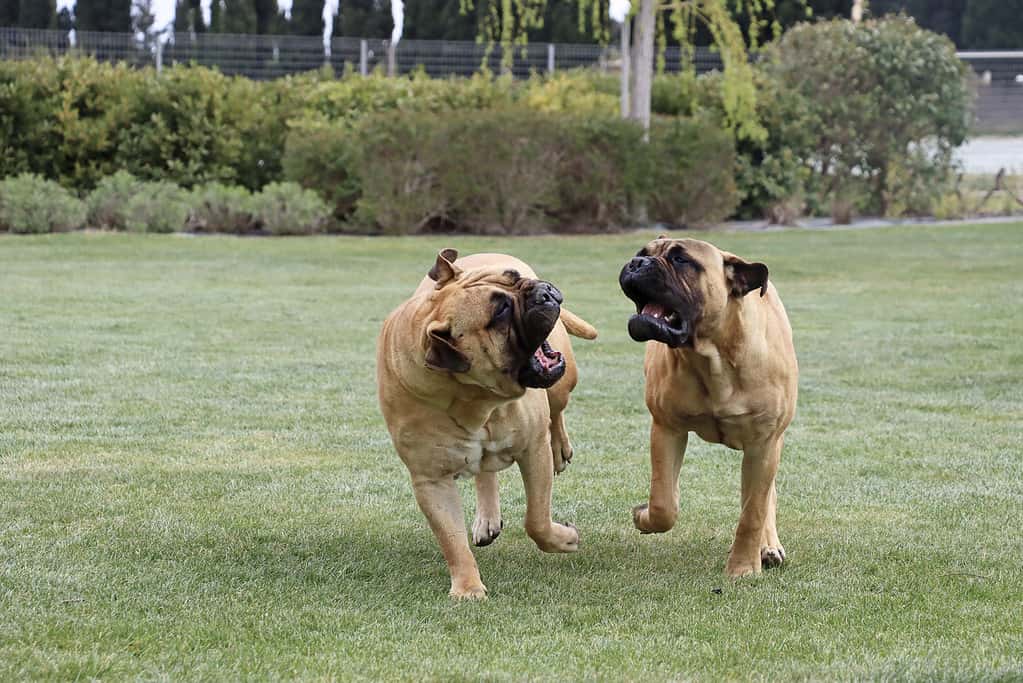
Mastiffs have one of the strongest bite forces of all the breeds used as guard dogs.
©Da Silva Emmanuelle/iStock via Getty Images
Because of their size, it should be no surprise that this breed has a powerful bite force. When measured, mastiffs have a bite force of 556 PSI. In comparison, German shepherds have a bite force of 238 PSI, and Rottweilers have 328 PSI. So, if you are in a dangerous situation and need protection, mastiffs are the perfect guard dog. They can quickly subdue other animals or human threats with their mighty bite force.
#7 Mastiffs Are Very Loyal
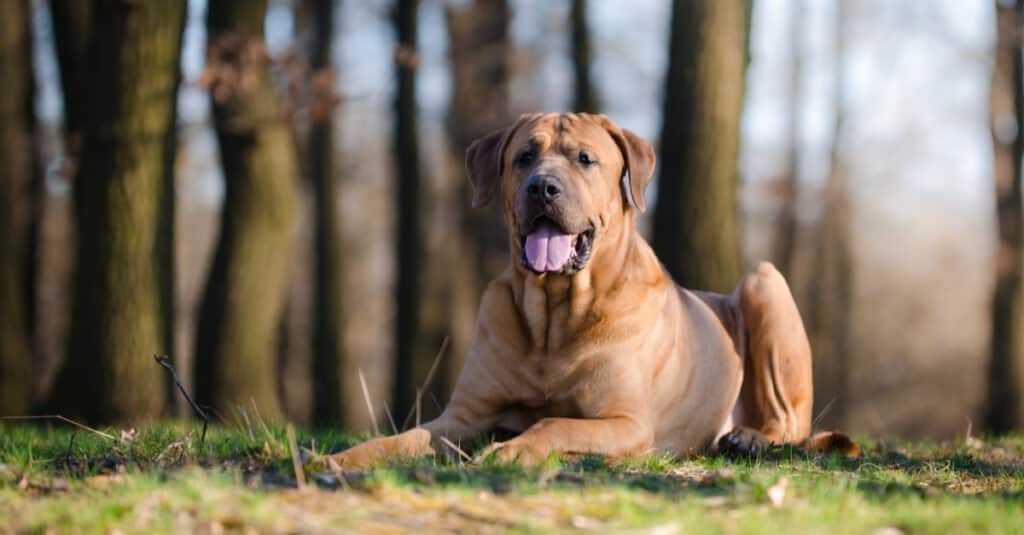
This gentle giant wants nothing more than to be close to its family.
©TMArt/Shutterstock.com
Their love for their human pack is incomparable. This unwavering loyalty creates strong bonds between the dog and the owner. But this trait especially shines in the face of danger. A mastiff’s loyalty supersedes its fear or self-preservation. They won’t hesitate to protect the ones they love. This incredible loyalty is the main reason mastiffs are the perfect guard dogs.
The photo featured at the top of this post is © Okikukai/iStock via Getty Images
Ready to discover the top 10 cutest dog breeds in the entire world?
How about the fastest dogs, the largest dogs and those that are -- quite frankly -- just the kindest dogs on the planet? Each day, AZ Animals sends out lists just like this to our thousands of email subscribers. And the best part? It's FREE. Join today by entering your email below.
Thank you for reading! Have some feedback for us? Contact the AZ Animals editorial team.






